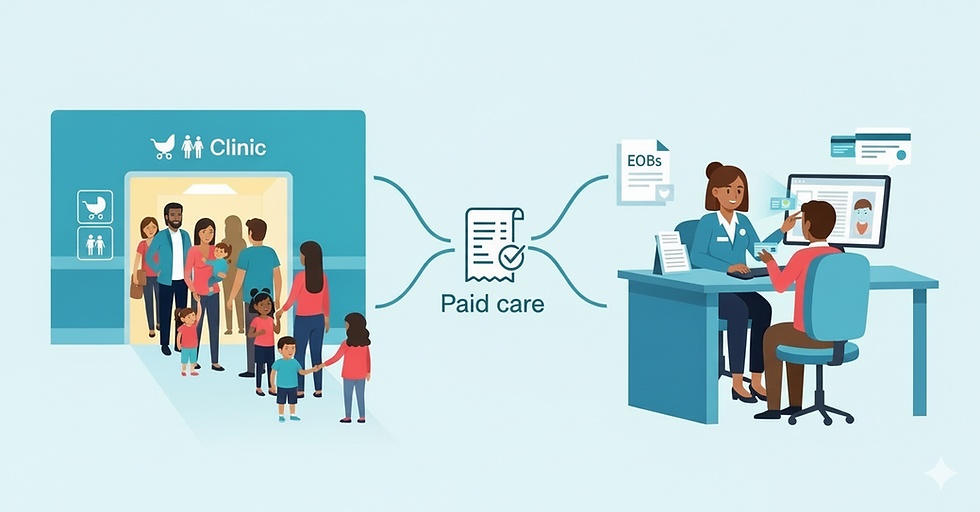Closing the Gap: How Third-Party Billing Solves Mental Health Reimbursement Woes
- Nicholas Burt, LMFT

- Aug 20, 2024
- 5 min read
The Ongoing Disparities in Mental Health Insurance Reimbursement and the Critical Role of Third-Party Billing Services
Mental health care in the United States has long struggled with significant disparities in insurance reimbursement rates compared to physical health care. Despite legislative efforts to bridge this gap, recent research underscores that these disparities persist, creating ongoing challenges for both providers and patients. This article explores these issues, drawing from the latest research and highlighting how third-party billing services like Bridgeway Billing can play a crucial role in mitigating these disparities.

The Persistent Parity Problem
The study titled "Behavioral Health Parity: Pervasive Disparities in Access and Network Care Continue" offers a sobering analysis of the current state of mental health insurance reimbursement. Despite the Mental Health Parity and Addiction Equity Act (MHPAEA) of 2008, which was designed to ensure that mental health and substance use disorder benefits are covered comparably to medical and surgical benefits, the reality remains far from this ideal.
The study reveals that behavioral health providers are reimbursed, on average, 23% less than their physical health counterparts for similar services. For instance, psychologists and psychiatrists face reimbursement rates that are, respectively, 23% and 19% lower than those for primary care physicians. This underpayment is not merely an administrative inconvenience—it directly impacts the financial viability of mental health practices. As the study notes, "The financial underinvestment in behavioral health by insurers translates into fewer resources for mental health care providers, which ultimately limits access for patients."
Moreover, the study highlights a significant discrepancy in out-of-network utilization. Patients are "5.4 times more likely to use out-of-network providers for behavioral health services than for medical or surgical services." This disparity not only increases the financial burden on patients but also reflects a broader issue: the inadequacy of in-network mental health providers. As more providers opt out of insurance networks due to low reimbursement rates, patients are left with fewer in-network options, often resulting in delayed care or higher out-of-pocket expenses.
The Impact on Providers
For mental health providers, these disparities pose substantial challenges. Lower reimbursement rates mean that many providers must either accept reduced income or increase their patient load to maintain financial stability—both of which can lead to burnout and reduced quality of care. Additionally, the administrative burden associated with mental health billing is significant. The study notes that "Behavioral health providers are 17% more likely to face administrative denials for their claims than their counterparts in physical health." These denials not only delay payments but also require providers to invest time and resources into appealing these decisions.
This situation creates a vicious cycle: low reimbursement rates and high administrative burdens drive providers to opt out of insurance networks, further exacerbating the shortage of in-network mental health professionals. As a result, patients seeking in-network care may face long wait times or be forced to pay higher out-of-network fees, which can deter them from seeking the help they need.
Moreover, the financial strain caused by low reimbursement rates and high administrative burdens can lead some providers to opt out of accepting insurance altogether. While this decision might reduce the headaches associated with insurance billing, it comes with its own set of risks. For providers, not accepting insurance can mean a significant loss of revenue, as many patients rely on their insurance to cover mental health care costs. This not only limits the provider's potential income but also restricts access for individuals who depend on their insurance to afford treatment, further exacerbating the issue of inadequate mental health care options.

The Role of Third-Party Billing Services
Given these complexities, many mental health providers are turning to third-party billing services like Bridgeway Billing to help navigate the challenging landscape of insurance reimbursement. Bridgeway Billing specializes in mental health billing, providing a range of services that can significantly alleviate the financial and administrative pressures on providers.
Maximizing Reimbursement: One of the key benefits of using a third-party billing service is the potential for increased reimbursement. Bridgeway Billing's team of experts is well-versed in the latest CPT codes, billing practices, and insurance policies. This expertise ensures that claims are submitted accurately and efficiently, reducing the likelihood of denials and underpayments. As the study highlights, "Proper billing practices can mitigate the financial disparities faced by behavioral health providers, ensuring they receive fair compensation for their services."
Reducing Administrative Burden: Another significant advantage of third-party billing services is the reduction in administrative burden. Mental health providers often face complex billing processes that require significant time and effort. Bridgeway Billing takes on this responsibility, allowing providers to focus on patient care rather than paperwork. This is particularly important in the mental health field, where the emotional and psychological demands on providers are already high. By outsourcing billing tasks, providers can reduce stress and avoid burnout, leading to better patient outcomes.
Ensuring Compliance: Compliance with ever-changing insurance regulations is a critical concern for mental health providers. Non-compliance can result in denied claims, audits, and even penalties. Bridgeway Billing stays up-to-date with the latest changes in insurance policies and regulations, ensuring that providers remain compliant. This proactive approach minimizes the risk of financial penalties and helps maintain the integrity of the provider's practice.
Improving Cash Flow: Timely and accurate billing directly impacts a practice's cash flow. Delayed payments can create financial strain, particularly for smaller practices that operate on tight margins. Bridgeway Billing's streamlined billing processes ensure that claims are processed quickly, reducing the time it takes for providers to receive payment. This improved cash flow can help stabilize a practice's finances, allowing providers to invest in their services and expand access to care.
Conclusion
The disparities in mental health insurance reimbursement are a significant barrier to both access and quality of care. As the "Behavioral Health Parity" study illustrates, these issues are deeply rooted and continue to affect both patients and providers. However, by partnering with a third-party billing service like Bridgeway Billing, mental health providers can better navigate these challenges, ensuring they receive the reimbursement they deserve while maintaining a focus on patient care.
In a field where every dollar counts, and every day matters, Bridgeway Billing offers the expertise and support that mental health providers need to thrive in an inequitable system. By alleviating the financial and administrative burdens, Bridgeway Billing empowers providers to continue their essential work of supporting the mental health and well-being of their communities. In doing so, they help bridge the gap between the promise of mental health parity and the reality of today's reimbursement landscape.
Important Metrics:
Reimbursement Disparities: Behavioral health providers are reimbursed, on average, 23% less than their physical health counterparts for similar services. Psychologists and psychiatrists specifically face reimbursement rates that are 23% and 19% lower than those for primary care physicians (Charlie Health).
Out-of-Network Utilization: Patients are 5.4 times more likely to use out-of-network providers for behavioral health services than for medical or surgical services. This results in higher out-of-pocket costs and limits access to care for those who rely on in-network providers (Charlie Health).
Administrative Burden: Behavioral health providers are 17% more likely to face administrative denials for their claims compared to physical health providers, leading to delayed payments and increased workload (Charlie Health).
Impact on Access to Care: Up to 75% of in-network mental health providers listed in insurance directories may not be available for appointments, further complicating access to care for patients (Charlie Health).
References:




Comments